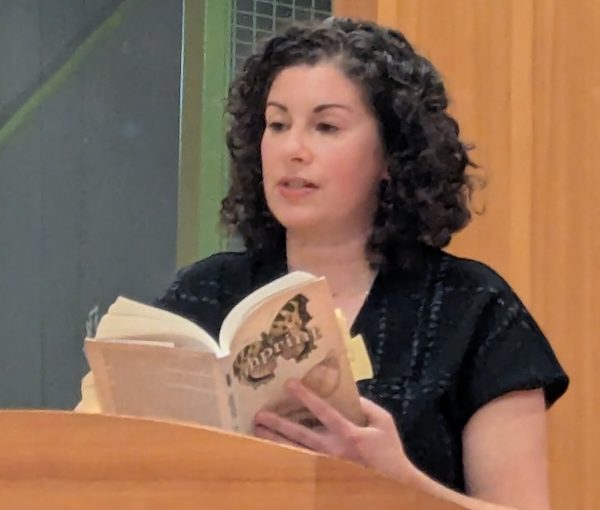Claire Sicherman read from her book Imprint, about intergenerational trauma, at UBC Hillel on Jan. 21. (photo by Pat Johnson)
Understanding of intergenerational trauma has expanded in recent decades. Two granddaughters of Holocaust survivors discussed the larger phenomenon and their personal experiences recently at the University of British Columbia’s Hillel House, part of Hillel’s Holocaust Awareness Week.
Claire Sicherman, author, workshop facilitator and trauma-informed somatic writing coach, shared her experiences and read from her book, Imprint: A Memoir of Trauma in the Third Generation, which was published in 2017. She was in conversation with Dr. Abby Wener Herlin, associate director of programs and community relations at the Vancouver Holocaust Education Centre, which co-sponsored the Jan. 21 event with Hillel BC.
Sicherman attributed to psychologist Dr. Arielle Schwartz the definition of intergenerational trauma as the ways in which the unresolved experiences of traumas, losses and griefs of one generation can become a legacy that is passed down to the next generation.
“In other words,” said Sicherman, “the experiences of my grandparents are passed down through my parents to me.”
In addition to the “nurture” component of family legacies, there is the “nature” component of epigenetics, which Sicherman described as “the study of how genes turn on and off in response to environmental change.”
“I’ve heard it talked about like it’s sort of like light switches switching on and off in the body,” she explained. “Whatever switches switched on for my grandparents would then be switched on, passed down to my parent, passed down to me.”
Experts in the field say it’s not a biological prison, Sicherman said. “They are actually malleable, so what you’re born with, you are not necessarily stuck with. We do have the ability to change certain things. There is hope in that.”
Growing up, Sicherman knew little or nothing about inherited trauma.
“When I started reading about it, I began to understand that what was going on with me wasn’t really my fault or that it wasn’t really something wrong with me,” she said. “It was just that I was carrying this huge thing.”
Reading excerpts from her book, Sicherman recounted being “disconnected from my body.” The inherited trauma manifested as a nervous system on overdrive and a tendency to hypervigilance. She was always ready to bolt out the door, looking for exit signs, aware of potential dangers, unable to fully rest, and prone to stress and anxiety.
She said that untold stories often pass more powerfully from generation to generation than stories that are recounted.
“When you think about that,” said Sicherman, “it’s what we don’t talk about that has more weight. It’s the silence. It’s the secrets.… That’s why it’s also important to me to speak out about these things, because it’s healing that goes across generations.”
Her survivor grandparents thought they were protecting their children through silence, Sicherman said. In response, the second generation learned not to ask questions.
There were other silences. In addition to the limited discussion around the Holocaust, Sicherman did not learn until well into her own adulthood that, when she was 4 years old, her grandfather had taken his own life, and not died of a heart attack, as she had been led to believe.
As someone who writes about and works with others on issues of healing intergenerational trauma, she urges people to embrace the totality of what they have inherited.
“Aside from trauma, what are the legacies that your ancestors bring to you?” she asked. “What are the gifts? What are the strengths? That’s also an important question to ask yourself, and a way of connecting with Jewish heritage. What are the strengths of your lineage? Is it survival? Is it tenacity? Is it humour? Is it creativity? Those are questions that you can ask yourself.”
Her son, Ben Sicherman, a UBC student, was present and also spoke of his family’s legacy of trauma. He described struggling with anxiety when he was younger and learning mechanisms for addressing issues through his parents’ modeling. He also spoke of carrying the legacy of his ancestors in ways like choosing 18 as his hockey number, not only because it represents chai, life, but because the numbers on his great-grandmother’s Auschwitz tattoo added up to the number 18.
Intergenerational trauma is a major component of her life’s work, said Sicherman.
“I do feel a sense of obligation, as a third generation,” she said. “But I also feel like this is part of my calling, too. It’s very meaningful. It’s an obligation that is not homework. It’s part of what I was set out to do.”

